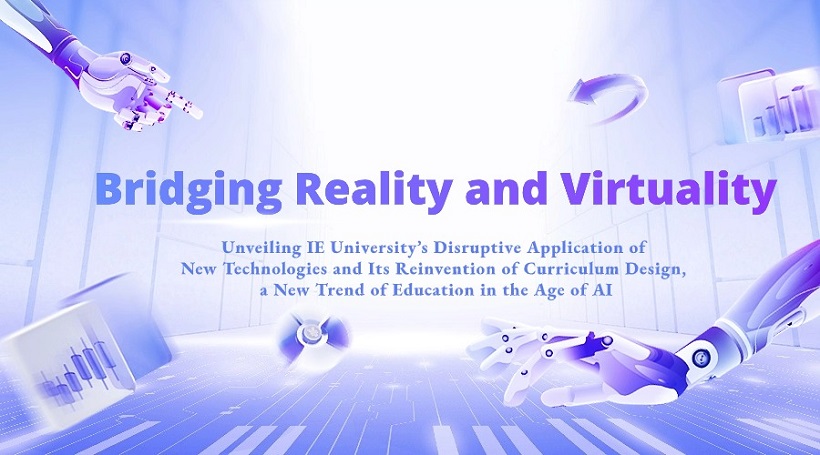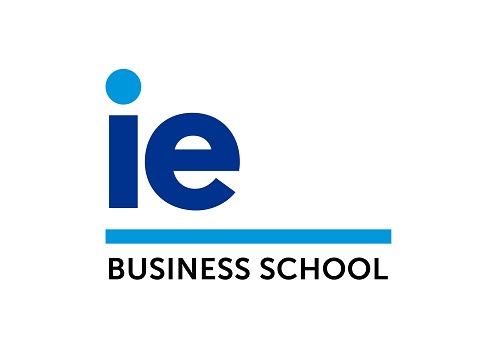A New Experience of Virtual Reality (VR)
Sophia, a young woman from Argentina, is the youngest daughter in her family. While her siblings work in their father’s company, Sophia has always aspired to have her own business. However, being introverted, she often appeared shy in social interactions. During her second year at IE, she opted for a public speaking training course as part of the entrepreneurship program. The teacher guided her to put on VR goggles and speak through scrolling text on the screen. The scenes included a familiar classroom setting with classmates appearing vividly before her eyes, some attentively listening while others mischievously engaged. Despite finding these scenarios challenging and having to calm her emotions multiple times, she felt unsatisfied with her presentation and pressed the button to redo the training six times. Throughout the hour and a half session, she took off the headset multiple times to rest.
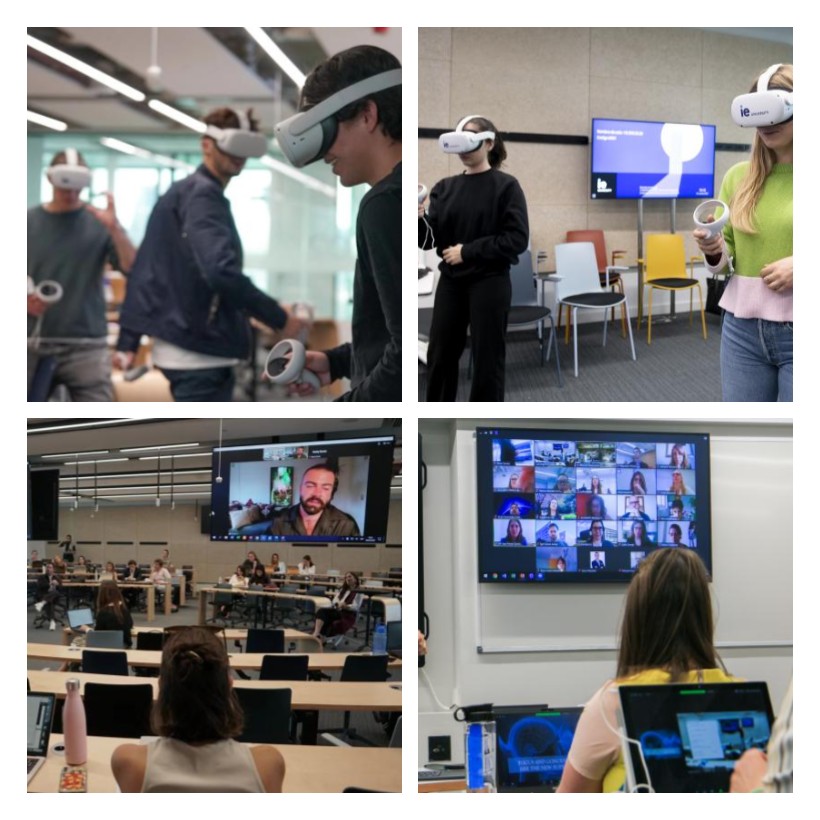
David, an MBA student at IE, is currently studying a marketing course. It is reported that the teacher assigned students to form teams, with each team responsible for opening a coffee shop in a specific country. They had the option to choose between a franchise model or an independent store setup. Each group of students was provided with a headset and instructed to enhance various aspects of the coffee shop in a virtual reality environment, from wall colors to furniture styles, and even the selection, pricing, and background music of the coffee menu. The marketing professor for this course explained that the objective of this application was to teach students to consider local cultural characteristics, demographic preferences, and product supply features when positioning a product, while fostering their imagination. The unexpected outcome of using this virtual reality technology was that students from different countries proposed a variety of coffee shop concepts, styles, and features, showcasing the diversity of global cultures. These insights may serve as valuable references for real-world business endeavors.
The aforementioned are the latest explorations of IE University in utilizing virtual reality technology in higher education. These applications have garnered enthusiastic interest from young students. IE University has been a global leader in educational innovation, with its Global Online MBA (GOMBA) program established over a decade ago ranking first globally in the 2024 Financial Times Global Online MBA ranking.

How does the world’s top-ranked online MBA program conduct classes?

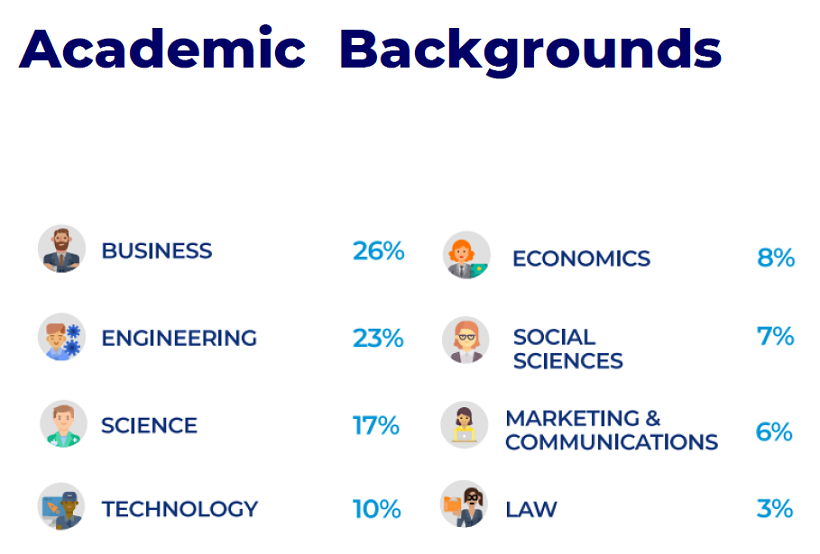
Students enrolled in IE’s Global Online MBA program come from various parts of the world. Taking the GOMBA cohort that commenced in September 2023 as an example, students hail from 39 countries, with an average age of 31 and an average of 8 years of professional experience. Among these students, 91% are international (18% from Europe, 30% from the Middle East and Africa, 17% from North America, 15% from the Asia-Pacific region, and 11% from Latin America), with only 9% originating from Spain. Women account for 45% of the student body, while men make up 55%. Representing diverse industries, including but not limited to healthcare, retail, technology, banking and insurance, consulting, real estate, energy, education, and media and entertainment, many are entrepreneurs, digital transformation leaders in companies, senior management consultants, project directors, M&A managers, and change management executives. The composition of this online MBA student cohort is comparable to that of many EMBA classes in China.
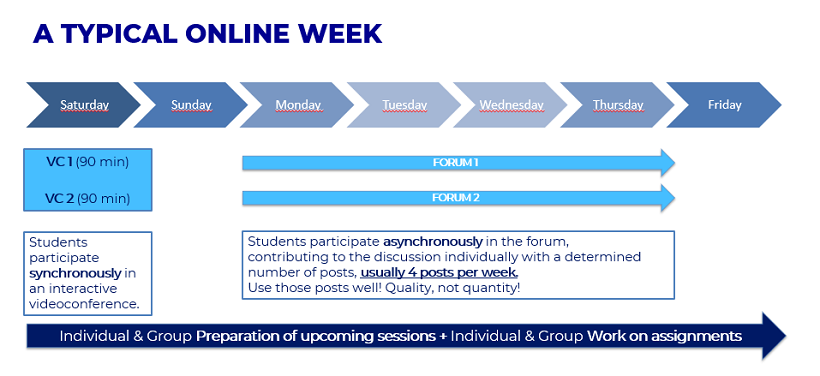
Regarding the course design of IE’s Global Online MBA, the editorial team of www.whichMBA.net conducted a specific interview with the program’s academic director, Prof. Budimir Sever, who shared the following learning experience of a student enrolled:
- Two Zoom video conferences are conducted every Saturday for the online sessions where all students participate.
- Monday to Thursday features discussion forums, with four important assignments to be collectively completed each week.
- Professors assess students based on their participation, individual and group work.
- At the conclusion of the course, students provide feedback on their satisfaction. Throughout the program, professors provide feedback on the students' progress.
Students access their course syllabus, discussion forums, submit assignments, and receive announcements from professors and project management team through their online campus tool, BlackBoard.
The academic requirements for all assignments are set by the Deputy Dean responsible for the Global Online MBA. Faculty selection is based on their industry experience related to a specific topic, with feedback reflecting student expectations.
Responding to inquiries from www.whichMBA.net regarding whether online MBAs can truly meet the needs of senior professionals, Prof. Sever highlighted the appealing value proposition of online learning for busy professionals. They seek top-tier business education without interrupting their careers. The flexible learning schedule facilitates coordination between professional commitments and personal responsibilities, enabling individuals to study at their own pace and on their own timetable. This flexibility ensures that pursuing an advanced degree or professional training does not require a hiatus in one’s career while enhancing professional skill development. For professionals, one of the most significant advantages of online learning is the immediate application of new knowledge and skills in their current roles. This real-time application not only reinforces learning but also enables individuals to contribute effectively to their organizations, generate immediate impact, and demonstrate the value of their education. In this context, online learning is not a disadvantage but a valuable asset.
IE University also provides opportunities for students to engage with peers from around the world, effectively balancing the advantages and disadvantages of online and offline learning. Contrary to the belief that online learning limits social interactions, the IE Global Online MBA program fosters broader and stronger connections through forums, virtual group projects, and online activities. These interactions enable students to build a global network of peers, industry experts, and alumni, crucial for professional development and collaboration.
Marisol Morales, a Global Online MBA 2024 student and Human Resources Manager at Concentrados Almosi, shared with www.whichMBA.net: “The IE Global Online MBA program has been a transformative experience for me. It has been a journey of open-mindedness and cultural awakening. Besides the academic and professional aspects, the program has provided me with an opportunity to meet a group of truly admirable friends from diverse backgrounds. Each classmate brings their unique culture and perspective, meaning that the amount learned from each other is as much as that from the course material. This aligns with an ancient Chinese saying: 'In teaching others, we teach ourselves.’"
When asked about potential areas for improvement within the top-ranked online MBA program, Deputy Dean Sever candidly acknowledged that IE’s culture is one of continuous improvement. While proud of the academic excellence of our Global Online program, we aim to provide the highest relevance for optimal learning outcomes. We are currently enhancing core courses in the following areas:
Exploring more comprehensive and holistic learning approaches. By surpassing traditional learning based on “learning fragments,” students gain a holistic perspective on the interconnections between external factors and various functional business areas, as well as the skills necessary to address opportunities and challenges in the digital age.
Investigating project-based learning activities. Collaborating with industry partners, students engage in real company projects in small groups, following internally developed problem-solving and design thinking methodologies. They apply their previous learning within a highly guided process, with mentors providing guidance.
Emphasizing more sustainable practices. Engaging in real sustainability challenges, students create differential impacts and acquire holistic methods to create long-term sustainable outcomes.
Explorations in Teaching Methods
IE University has designed various methods, content, and experiences related to virtual reality, covering areas such as technology, sustainability, negotiation, marketing, and communication, deepening learning and fostering decision-making and classroom discussions. Collaborating with technology partners like Meta, IE University has established immersive XR labs on its Madrid and Segovia campuses, providing training in the Liquid Learning mode using Meta Quest 2 and cutting-edge AR glasses. IE University has also partnered with professional training application companies such as Bodyswaps and Virtualspeech, as well as metaverse and immersive experience development companies like Unity. Borja Santos Porras, Executive Director of IE’s School of Global and Public Affairs, introduced to Business School Encyclopedia reporters how his BBA students virtually traveled to other parts of the world in the “Aid, Development, and Social Entrepreneurship” course to better understand the living realities of local communities. Through this approach, students contribute to understanding local social and economic development.
CEO of IE University, Diego del Alcázar Benjumea, stated: “Technology enables us to experience new things, bringing education to a new dimension. We adopt an active, collaborative, applied, and personalized approach.” He emphasized, “XR, or extended reality, is crucial to our lives as it represents new ways of interacting with ourselves and machines, bridging the boundaries between the real and digital worlds.” He continued, “At IE University, we understand that grasping new realities is essential, hence we actively leverage these technologies and incorporate them into campus life to understand their impact on student experiences.”
Epilogue: The Future is Now
In the not-so-distant future, each student enrolled in IE’s Global Online MBA program or other courses may receive a VR headset sent by the school, containing various exclusive applications. Despite being miles apart, whenever they put on the headset at a designated time, their human digital twin avatars can attend classes together at IE Tower in Madrid, with Sophia eagerly sharing her thoughts on how to bring that coffee shop to her hometown in Argentina.
The new educational approach brings global top-tier educational resources closer to us. Between reality and virtuality lies the essence of the universe! Educators around the world, how shall we respond to this paradigm shift?



